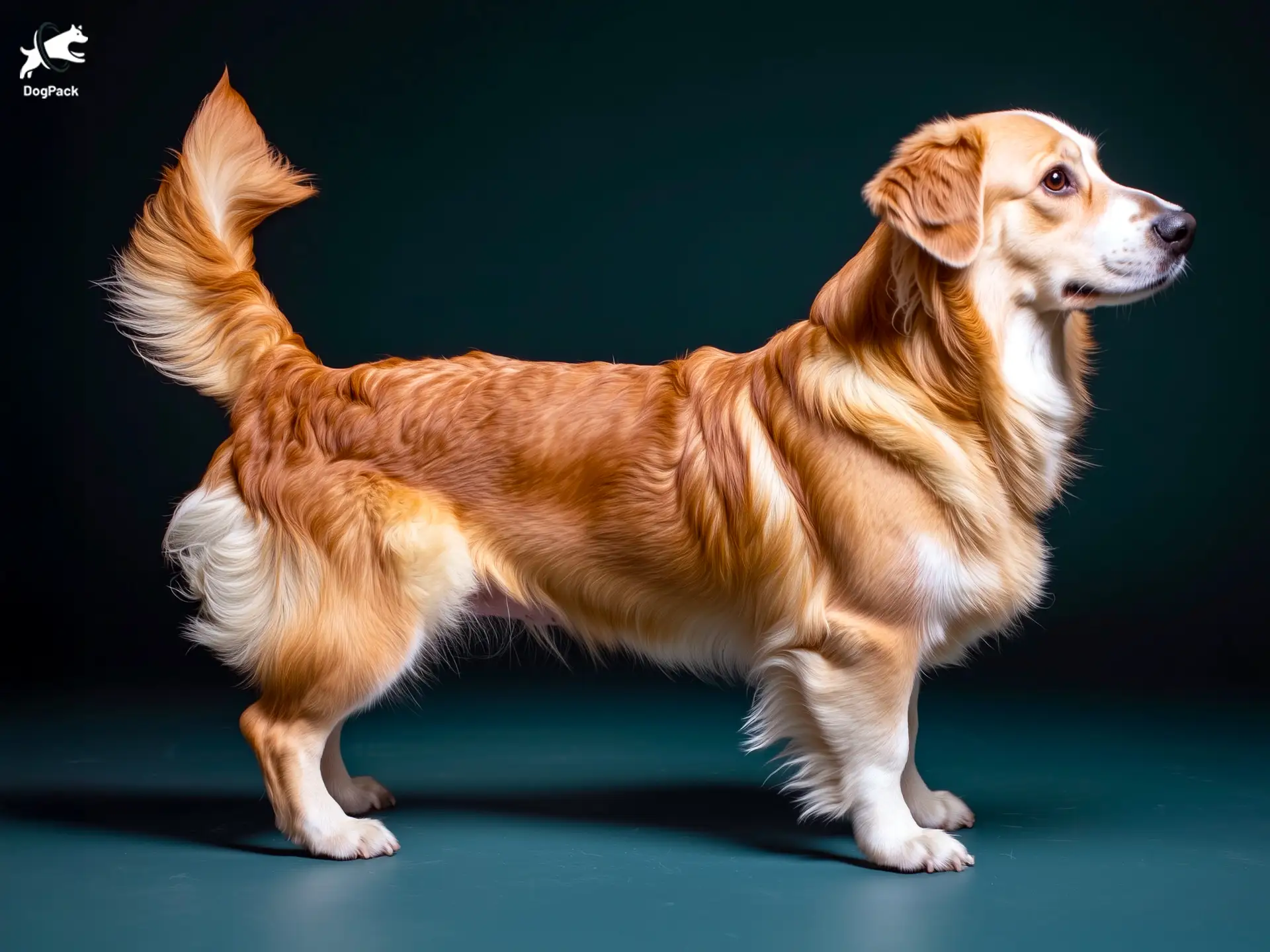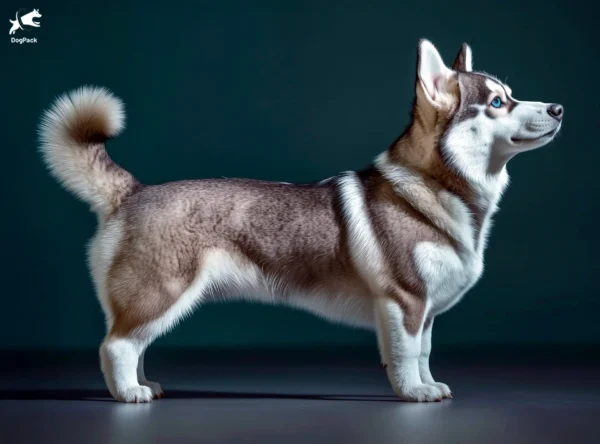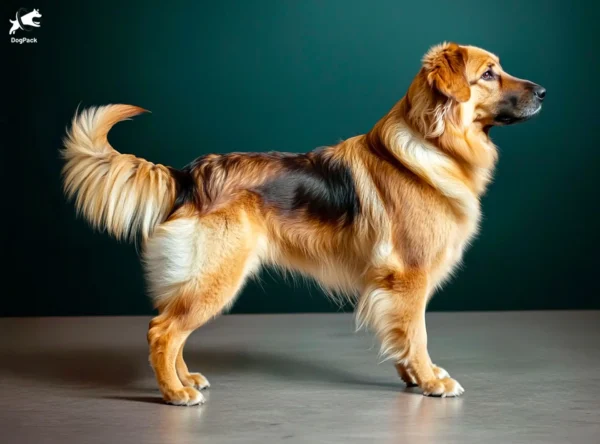Golden Retriever Corgi Dog Breed Info & Overview
Picture a short-legged pup with a heart of gold, and you get the Golden Retriever Corgi. Beloved for their sunny temperament and unique look, this hybrid charms families with its delightful blend of intelligence, playfulness, and affection. Whether you’re seeking a running buddy or a cuddle companion, this endearing crossbreed never fails to brighten any home.
Characteristics
Pictures
Breed History
Despite being a modern mix, this lovable cross draws upon two treasured lineages. The Golden Retriever hails from 19th-century Scotland, where it excelled at retrieving game for hunting enthusiasts. The Corgi, meanwhile, earned its stripes herding livestock in medieval Britain. By blending these legacies, breeders aimed to create a companion with both the Golden’s gentle nature and the Corgi’s herding intelligence.
While no one knows exactly when or where the first Golden Retriever Corgi appeared, many believe it emerged in the United States during the late 20th-century “designer dog” trend. Early enthusiasts sought to combine the affectionate nature of the Retriever with the compact frame of the Corgi. Over time, this unique hybrid found favor among families wanting a spirited yet loyal friend.
As interest in hybrid dog breeds grew, the Golden Retriever Corgi steadily gained popularity. It remains unrecognized by major kennel clubs, but that hasn’t stopped devoted owners from celebrating its delightful mix of traits. Online communities and local meetups have helped showcase this crossbreed’s playful energy, forging a small yet passionate following that appreciates its cheerful spirit and eager-to-please personality.
Temperament, Personality
These pups typically exude confidence and a can-do attitude, courtesy of their Corgi heritage, while retaining the Golden’s gentle sweetness. Expect plenty of enthusiastic greetings when friends drop by, as they adore making new connections. Their cheerful presence and curious nature help them fit in seamlessly with most household dynamics, whether they’re trailing you around the home or sprawled at your feet.
They can be a great match for families with children, often proving patient and protective but also ready for a good romp. Early socialization helps them remain calm around other pets, though some herding instincts may trigger playful nips at kids’ heels. Introduce them to different environments regularly, offering positive experiences that let them practice greeting strangers and meeting new animal friends.
The Golden Retriever Corgi generally thrives on interaction and doesn’t enjoy being left alone too long. If bored, they can turn to chewing or barking. By providing structured play, walks, or puzzle toys, you’ll harness their lively disposition in constructive ways. They soak up companionship like sponges, rewarding attentive owners with unwavering devotion and happy tail wags whenever you return from even a brief outing.
Physical Characteristics
This cross typically sports a sturdy body, melding the Retriever’s athletic frame with the shorter-legged physique of the Corgi. They appear compact but can be surprisingly robust. Keeping an eye on proper nutrition and exercise is crucial, especially as their body shape may put extra strain on joints if they become overweight. Fortunately, a balanced regimen preserves mobility and prevents undue stress.
A double coat, often medium to long, is standard. Coloring varies widely, but shades of gold, red, and sometimes sable dominate, occasionally with distinctive white patches reminiscent of the Corgi lineage. Though undeniably cute, this thick fur sheds heavily and can mat if neglected. Brushing the undercoat routinely not only reduces shed fur but also helps keep their skin and coat healthy.
Most Golden Retriever Corgis have soulful, alert eyes and ears that may be upright like a Corgi’s or softly flopped like a Golden’s. Tails can differ, too—some inherit the classic Corgi docked look, while others display a fuller tail. Either way, their expressive faces often give them a friendly, inquisitive appearance, turning heads wherever they go and drawing compliments on their distinctive features.
Health Issues
Hip dysplasia ranks high on the list of concerns, as both parent breeds can pass down this condition. Keeping them at a healthy weight limits strain on their hips and elbows. Additionally, their elongated spine may be prone to back problems like intervertebral disc disease, so activities involving repeated high jumps or stairs should be approached with caution.
Eye issues, including progressive retinal atrophy, may also crop up. Regular veterinary checkups and recommended screenings for both eyes and joints are key to catching problems early. Since this mix can inherit genetic predispositions from two different lines, it’s wise to follow a vet-approved preventive care schedule, which might include additional tests or specific dietary recommendations to support bone and joint health.
Owners of the Golden Retriever Corgi should watch for unhealthy weight gain, as obesity compounds stress on joints and the spine. Sticking to a well-balanced diet and ensuring daily exercise helps ward off potential complications. Also, consider discussing supplements like glucosamine or fish oil with your vet to support mobility. By staying proactive, you’ll give your four-legged friend the best chance at a long, vibrant life.
Grooming Needs
Their plush double coat can produce impressive amounts of shed fur, especially during seasonal molts. Weekly brushing with a slicker brush or grooming rake removes loose hair and minimizes tangles. Some owners opt for professional grooming every few months, helping keep the coat tidy and reducing the tufts of fuzz that tend to accumulate on furniture and floors.
Bathing once every month or so generally suffices, though active dogs that love muddy adventures might need more frequent washes. Use gentle shampoos that preserve the coat’s natural oils. Thorough rinsing is important to avoid residue that could irritate the skin. Given their dense undercoat, ensure they dry completely—damp fur trapped close to the skin can lead to mildew smells or minor infections.
Regular nail trims, typically once or twice a month, prevent discomfort or splitting. Pay close attention to their ears—if they fold, moisture can accumulate, making them susceptible to infections. Check and clean them gently once a week with a vet-approved solution. With consistency and a bit of patience, maintaining the Golden Retriever Corgi’s coat and overall hygiene becomes a straightforward routine.
Exercise Requirements
These spirited dogs benefit from at least an hour of daily physical activity, with some individuals thriving on more. Think brisk walks in the park, backyard play sessions, or even low-impact agility courses. Many enjoy a good game of fetch, especially if it involves toys that engage their retrieving instincts. Varying the activities prevents boredom and keeps their mind and body sharp.
Mental stimulation is just as vital as physical exercise. Puzzle feeders, obedience challenges, or scavenger hunts around the yard maintain their sharpness. Avoid repetitive high-impact jumps, which can be tough on their shorter legs and backs. Instead, incorporate safer options like gentle obstacle courses. By blending mental and physical workouts, you’ll help them burn energy while nurturing that inquisitive brain.
For a Golden Retriever Corgi, consider splitting daily exercise into two shorter sessions—a brisk walk in the morning and an active playtime in the evening. This approach caters to their moderate-to-high energy levels without overwhelming them. Ensuring enough outlets for activity helps reduce unwanted behaviors, like chewing or barking, born from pent-up energy. A content, well-exercised pup is a joy to live with.
Training Tips
Training this hybrid can be a delight, given their intelligence and eagerness to impress. Both Golden Retrievers and Corgis enjoy learning tasks when rewards are clear and consistent. Praise, treats, and play as positive reinforcement go a long way. Keep sessions short but frequent—these dogs are quick learners, but they can grow bored or stubborn if training feels repetitive.
Early socialization broadens their comfort zone around strangers, children, and other animals. Gradually introduce them to new sights and sounds in a controlled manner. Because some Corgis are natural herders, watch for nipping or “heeling” behaviors. Gentle correction paired with redirection—like a fun toy or command—teaches them appropriate interaction skills, ensuring they remain polite and confident in various social settings.
For a Golden Retriever Corgi, short bursts of focused training can work wonders. Incorporate variety by rotating commands, obstacle courses, and puzzle games. Engage them mentally by mixing basic obedience cues with agility or trick training. If they show signs of stubbornness, a calm, firm approach quickly reminds them who’s in charge. With patience and creativity, you’ll mold a well-mannered companion.
Nutrition, Diet
Because of their moderate-to-large stature and activity level, these pups thrive on a premium kibble geared toward medium breeds. Look for formulas with real meat as the first ingredient and around 24–28% protein. Healthy fats like fish oil help maintain their plush coat. Steer clear of artificial additives or overly grain-heavy products, opting instead for balanced nutrients that support muscle, joint, and coat health.
Most Golden Retriever Corgis do well with 1.5 to 2.5 cups of dry food per day, split into two meals. Adjust according to your dog’s age, exercise routines, and metabolism. Keep an eye on their body condition—if you notice too much padding around the ribs or hips, reduce portions slightly or switch to a lower-calorie food to ward off unhealthy weight gain.
Joint-friendly supplements, like glucosamine or chondroitin, can benefit this mix if recommended by your vet. Since they may inherit a predisposition for hip dysplasia, staying on top of their weight and nutrition is critical. Avoid free-feeding, as these dogs can be food-motivated and prone to overeating. With mindful portion control and high-quality ingredients, you’ll help them stay spry and active for years.
Adoption, Breeders
If you’re searching for a Golden Retriever Corgi puppy, start by contacting local Corgi and Golden Retriever rescues; they sometimes receive mixed-breed dogs needing homes. Reputable shelters or rescue networks often post about available hybrids, and you may stumble upon older dogs that have outgrown the puppy stage. A bit of patience can lead to finding your perfect match.
When working with breeders, verify they conduct health tests on both parent dogs, especially for hip, elbow, and eye conditions. A responsible breeder will openly discuss any past health issues in their lines and provide references. The American Kennel Club Marketplace and Petfinder are potential starting points for finding reputable listings, though you’ll need to do additional research to ensure ethical breeding practices.
Puppy mills or suspiciously cheap offers could mask poor breeding conditions or hidden health problems. Always ask to see where the pups are raised and, if possible, meet the parents. Adopting a Golden Retriever Corgi can be a long-term joy if you choose a source that prioritizes welfare and temperament. With diligence, you’ll set the foundation for a happy, healthy life together.
Family Pet?
These dogs usually slot right into family life, greeting children and adults alike with a cheerful attitude. Their sturdy build and playful energy make them excellent companions for kids who understand proper dog manners. A gentle introduction ensures they won’t nip or chase children, which sometimes happens if their herding instincts surface.
Golden Retriever Corgis also tend to get along with other pets, including cats, especially if socialized from a young age. They appreciate a lively household where someone is typically around to engage them. Because they are deeply people-oriented, long stretches of solitude can lead to loneliness or mischief—so families with plenty of interaction time are ideal.
Ultimately, a Golden Retriever Corgi fits well in a family that balances affection with training and exercise. They thrive under structured daily routines, soaking up every bit of attention. Children can easily be enlisted to help with simple tasks like brushing or tossing a ball, forging a strong bond. If you’re looking for a loyal, spirited, and social four-legged friend, this mix could be your dream addition.
Right For You?
These dogs are not couch potatoes. They suit individuals or families who enjoy daily walks, playful interactions, and consistent mental challenges. A house with a yard is helpful, but not mandatory if you commit to providing enough outdoor time. Their moderate shedding might be a drawback for neat freaks, and those with severe allergies should approach this breed cautiously.
If your schedule keeps you away for extended periods, the Golden Retriever Corgi might struggle with separation anxiety. They crave companionship and can act out when lonely. Grooming needs and exercise requirements also call for a fair amount of dedication—regular brushing, nail trims, and joint-friendly activities. Failing to meet these needs can create an unhappy pup and a stressful home environment.
A Golden Retriever Corgi may be your perfect match if you’re prepared to invest time, energy, and plenty of affection. They offer unwavering loyalty, comedic charm, and a genuine desire to be your sidekick in every adventure. Prospective owners should carefully weigh their routines and resources, ensuring they can keep this vibrant hybrid healthy and mentally engaged for years to come.
Conclusion
In conclusion, this charming cross combines the best of both worlds: the Golden’s gentle warmth and the Corgi’s spirited energy. If you have the time to handle regular grooming, daily play sessions, and a healthy training routine, a Golden Retriever Corgi can become an outstanding companion. They offer unconditional loyalty, a friendly demeanor, and a knack for brightening any room they enter. While not suited for every lifestyle—particularly those lacking the schedule to meet its social and exercise needs—this hybrid quickly wins hearts with its lovable quirks. By doing proper research, adopting from responsible sources, and committing to positive reinforcement, you’ll set the stage for a lifetime of happiness with this one-of-a-kind canine friend.
FAQs
-
Does the Golden Retriever Corgi inherit the Corgi’s short legs?
Yes, many Golden Retriever Corgis inherit the Corgi’s short legs and long body, but some have a more balanced height. The mix of genes means each puppy’s proportions can vary, with some looking like miniature Golden Retrievers with a Corgi’s sturdy build.
-
Why does my Golden Retriever Corgi have so much energy?
This breed comes from two highly active parents, so Golden Retriever Corgis often have high stamina and playful energy. Daily exercise, including fetch, agility games, and walks, helps keep them mentally and physically engaged. Without enough activity, they can become restless.
-
Do Golden Retriever Corgis have herding instincts?
Yes! Thanks to the Corgi’s herding background, some Golden Retriever Corgis may instinctively try to herd children, other pets, or even their owners by nipping at heels or circling them. Training and redirection through structured activities can help manage this behavior.
-
Is the Golden Retriever Corgi prone to back problems?
If they inherit the Corgi’s long body and short legs, Golden Retriever Corgis may be prone to intervertebral disc disease (IVDD), a spinal condition common in long-backed breeds. Preventing high-impact jumps and maintaining a healthy weight can reduce the risk.
-
Do Golden Retriever Corgis love water like Golden Retrievers?
Many Golden Retriever Corgis enjoy swimming, but some inherit the Corgi’s preference for staying on land. If your pup is hesitant, introduce water slowly with positive reinforcement. A doggy life vest can also help them feel more comfortable in deeper water.
Breed Ratings
The Golden Retriever Corgi inherits sharp minds from both parents, excelling in training and puzzle-based tasks.
Playful and lively, this hybrid loves games and interactive toys, ensuring there’s never a dull moment at home.
Although not hyperactive, they need daily walks and mental stimulation to stay balanced, making them great for active families.
Their plush double coat sheds heavily, especially seasonally, so regular brushing is crucial to manage fur around your home.
While not overly predatory, some may chase small critters due to their Corgi background, so supervision outdoors is advisable.
Frequent brushing is needed, but they don’t require elaborate styling. Routine coat care helps control shedding and matting.
Eager to please but occasionally stubborn, they respond best to positive reinforcement and short, consistent training sessions.
They thrive on companionship and can develop separation anxiety if left for long periods without mental or social stimulation.
They’ll alert you to visitors and unfamiliar noises but aren’t typically excessive barkers if well trained and engaged.
Not heavy droolers, though some may salivate when excited or waiting for a tasty treat, which is usually manageable.
Generally sociable with other dogs, especially when socialized early, though some herding tendencies may require supervision.
Prone to joint and back issues, but with responsible breeding, balanced exercise, and proper care, they can enjoy good overall health.













